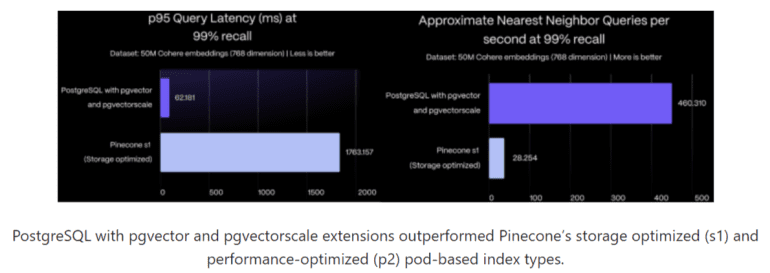- Timescale introduces pgvectorscale and pgai extensions for PostgreSQL, enhancing scalability and usability for AI applications.
- pgvectorscale offers superior performance with innovations like StreamingDiskANN index and Statistical Binary Quantization, outperforming Pinecone in benchmarks.
- pgai simplifies AI application development by enabling OpenAI embeddings and chat completions directly within PostgreSQL.
- Industry experts commend the extensions for their transformative potential and cost efficiency, challenging specialized vector databases like Pinecone.
- PostgreSQL equipped with pgvectorscale proves to be significantly more cost-effective than Pinecone, signaling a shift in the market dynamics.
Main AI News:
In a groundbreaking stride, Timescale, the leading PostgreSQL cloud database provider, has introduced two game-changing open-source extensions, pgvectorscale, and pgai. These innovations not only catapult PostgreSQL ahead of Pinecone in AI workloads but also slash costs by a staggering 75%. Let’s delve into the mechanics of these extensions and their profound impact on AI application development.
Unlocking the Potential of pgvectorscale and pgai
Timescale’s unveiling of pgvectorscale and pgai marks a pivotal moment in PostgreSQL’s evolution, aimed at elevating its scalability and user-friendliness for AI applications. These extensions, licensed under the open-source PostgreSQL license, empower developers to craft retrieval-augmented generation, search, and AI agent applications at a fraction of the cost associated with specialized vector databases like Pinecone.
Pioneering Innovations for Enhanced AI Performance
pgvectorscale is meticulously engineered to empower developers in constructing highly scalable AI applications with superior performance embedding search capabilities and cost-effective storage solutions. It introduces two groundbreaking innovations:
- StreamingDiskANN index: Borrowed from pioneering research at Microsoft, this index dramatically amplifies query performance.
- Statistical Binary Quantization: Forged by the adept researchers at Timescale, this technique surpasses conventional Binary Quantization, ushering in substantial performance enhancements.
Timescale’s rigorous benchmarks illustrate the prowess of pgvectorscale, showcasing PostgreSQL’s achievement of 28x lower p95 latency and 16x higher query throughput than Pinecone for approximate nearest neighbor queries at 99% recall. Unlike its predecessor pgvector, scripted in C, pgvectorscale is crafted in Rust, heralding new avenues for community involvement within the PostgreSQL realm.
pgai streamlines the development landscape for search and retrieval-augmented generation (RAG) applications. It empowers developers to seamlessly generate OpenAI embeddings and access OpenAI chat completions directly within PostgreSQL. This integration streamlines tasks like classification, summarization, and data enrichment on existing relational data, expediting the development lifecycle from proof of concept to production.
Real-World Implications and Developer Endorsements
Industry luminaries have lauded the transformative potential of these extensions. Web Begole, CTO of Market Reader, hails pgvectorscale and pgai as instrumental for AI application development within PostgreSQL, citing the integration of embedding functions directly within the database as a game-changer. Meanwhile, John McBride, Head of Infrastructure at OpenSauced, underscores the value of these extensions in the PostgreSQL AI ecosystem, particularly praising the lightning performance promised by Statistical Binary Quantization for vector search tasks.
Redefining the Landscape of Vector Databases
Traditionally, dedicated vector databases such as Pinecone have dominated the scene due to their unparalleled performance, courtesy of purpose-built architectures tailored for storing and searching extensive volumes of vector data. However, Timescale’s pgvectorscale disrupts this paradigm by seamlessly integrating specialized architectures and algorithms into PostgreSQL. According to Timescale’s benchmarks, PostgreSQL equipped with pgvectorscale achieves 1.4x lower p95 latency and 1.5x higher query throughput than Pinecone’s performance-optimized index at 90% recall.
Cost-Effectiveness and Accessibility at Scale
The cost advantages of leveraging PostgreSQL with pgvector and pgvectorscale are monumental. Self-hosting PostgreSQL proves to be approximately 45 times more economical than opting for Pinecone. Specifically, PostgreSQL entails a monthly cost of around $835 on AWS EC2, in stark contrast to Pinecone’s $3,241 per month for the storage-optimized index and $3,889 per month for the performance-optimized index.
The Future of AI Applications Flourishes with PostgreSQL
Timescale’s groundbreaking extensions fortify the ethos of the “PostgreSQL for Everything” movement, wherein developers strive to simplify intricate data architectures by harnessing PostgreSQL’s robust ecosystem. Ajay Kulkarni, CEO of Timescale, underscores the company’s mission: “Through the open-sourcing of pgvectorscale and pgai, Timescale endeavors to establish PostgreSQL as the quintessential database for AI applications. This obviates the necessity for standalone vector databases, streamlining data architecture for developers as they scale.”
Conclusion:
The introduction of pgvectorscale and pgai extensions by Timescale signifies a significant shift in the landscape of AI database solutions. PostgreSQL, empowered by these extensions, not only rivals but surpasses specialized vector databases like Pinecone in terms of performance and cost efficiency. This move not only benefits developers by streamlining AI application development but also signals a broader trend towards PostgreSQL’s dominance in the AI database market, potentially reshaping industry dynamics.

